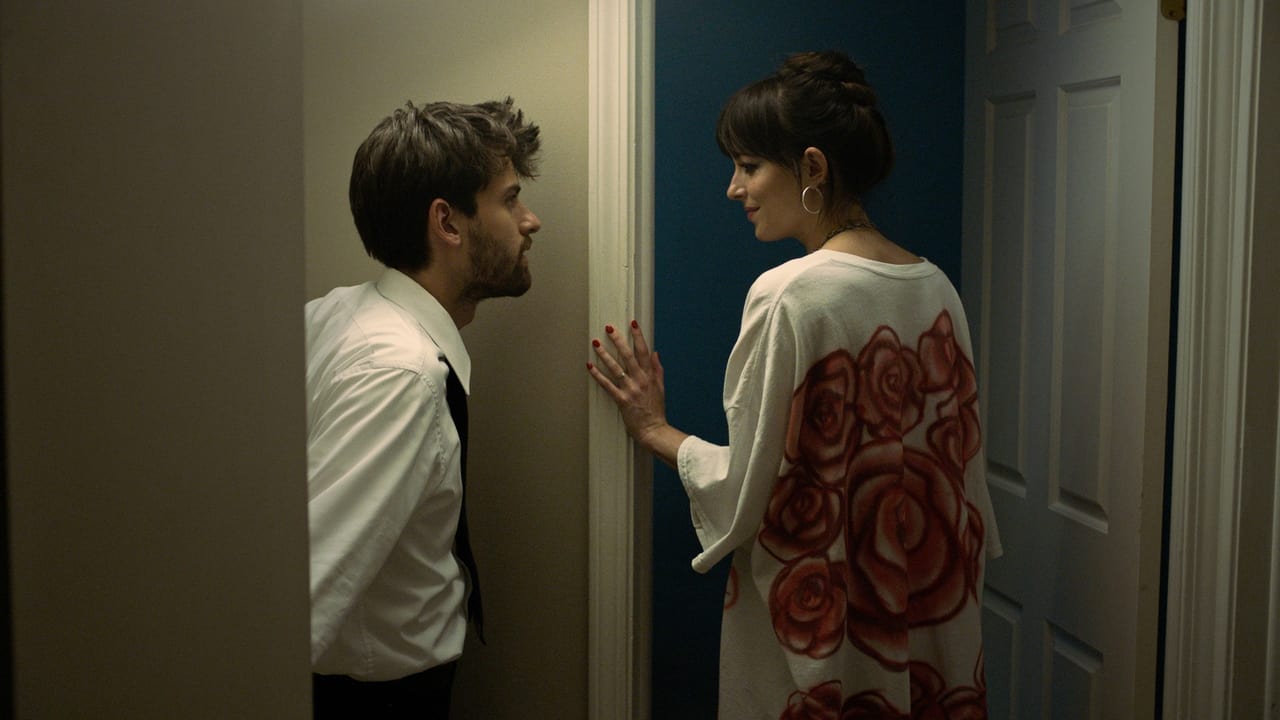
Opinions about Cooper Raiff’s 2020 debut feature were sharply divided, as one might well expect of a movie called Shithouse. (Or S#!%HOUSE, as the poster censored it.) What came as a surprise was that those who despised it were put off not by vulgarity but by sensitivity. Raiff, then all of 22, not only wrote and directed the low-budget indie but starred in it, playing a college freshman so lonely and homesick that at one point he bails on a sure-fire sexual opportunity in order to tearfully call his mother—a moment calibrated exclusively for pathos, not comedy. Never having seen this particular dude onscreen before, I found his open vulnerability refreshing, especially in conjunction with Raiff’s amiable, lightly self-deprecating manner. (He’s a bit like Chris Eigeman stripped of sarcasm, which sounds oxymoronic but works surprisingly well.) And my admiration deepened when Shithouse revealed itself as the story of someone incapable of accepting that he’s been ghosted by the young woman with whom he shared what had seemed to him a life-altering, Before Sunrise-style night of pure romantic bliss. Only a hideously misjudged coda, manufacturing a preposterous happy ending, made me wonder whether the haters might perhaps have a point.
Yes and no. On the one hand, Raiff’s sophomore effort, Cha Cha Real Smooth (another potentially alienating title!), ends on an appropriately bittersweet note, resisting the temptation to scuttle real complexity at the last minute for the sake of audience goodwill. On the other hand, there’s much less real complexity to scuttle. Cha Cha won the Audience Award (Dramatic Competition) at Sundance earlier this year, and is very much the kind of indie film that seems to have that particular goal in mind; everything about it, from its milieu to its basic scenario to its strategic deployment of a hugely lovable character on the autistic spectrum, tugs at your heart in the coziest and least challenging way possible. That goes double for woe-is-me protagonist Andrew (played by Raiff), an aggressively compassionate goofball to whom others constantly say things along the nauseating lines of “Do you know what you look like right now? You look like the sweetest person ever.” Indeed he does, and that’s the movie’s main problem. Raiff’s not entirely unaware of this, and eventually provides a short window of selfish, thoughtless behavior on the part of a deeply wounded Saint Andrew, but even that gets speedily and heartily apologized for.
Still, Cha Cha’s at least agreeably light on its feet. And it’s hard not to feel for Andrew, who’s introduced at the age of roughly 12 (played by Javien Mercado) boldly declaring his love to Bella (Kelly O’Sullivan), who’s roughly twice his age, and getting shot down—gently, but so firmly that Raiff cuts to a shot of Andrew staring glumly out of the car window on the drive home before Bella can even fully articulate the final ‘d’ on “I’m old.” A decade later, Andrew’s freshly home from college, stuck sharing a bedroom with his middle-school-age brother, David (Evan Assante), and working the counter at a hideously garish fast-food mall outlet called Meat Sticks. Chaperoning David at a bat mitzvah party, he’s immediately drawn to a woman and her teenage daughter, sitting alone as everyone else dances…just as his younger self had fallen for Bella after seeing her take an upsetting phone call in the stairwell and then return to keep running a similar function with a huge smile. Domino (Dakota Johnson) explains that Lola (Vanessa Burghardt) is autistic and disinclined to socialize beyond just showing up. Andrew bets Domino $300 that he can get Lola onto the dance floor; the belated reveal of how he accomplishes this makes for one of Cha Cha’s best jokes.
So begins a dual relationship that’s never less than engaging, even as it pushes a lot of very easy buttons. The part involving Lola, for whom Andrew frequently “babysits,” strongly echoes Jerry Maguire’s affection for Dorothy’s precocious, factoid-spouting son; Burghardt’s on the spectrum herself, and her beautifully judged performance feels more credible than do those of most neurotypical actors attempting such roles, but Raiff has also written Lola’s lines in a comically stilted way that seems not far removed from, say, Sheldon Cooper on The Big Bang Theory. And the emotional trajectory’s very predictable. “My mom sometimes will scratch my back,” Lola tells Andrew early on, when he asks her what she usually does before going to sleep, “but I do not want you to do that. I do not let anybody but my mother touch my back.” Viewers who don’t settle in and await the inevitable moment when Lola finally lifts this restriction haven’t been paying attention to Cha Cha’s…well, real smoothness.
Even less challenging or ambitious is the May-December (or May-July, really) romance between Andrew and Domino, echoing his childhood heartbreak. Bella had apparently worked as a “party starter” on the bar/bat mitzvah circuit, hired to coax bashful kids into having fun; Andrew proves to be ideally suited for the job himself, apart from the occasional clash with asshole parents of obnoxious bullies. People in need suck him in like a tractor beam, and he detects a core of sadness in Domino, who’s engaged to be married to a lawyer (who spends much of his time working a case in Chicago; the film’s set in Livingston, NJ) but flirts madly with Andrew nonetheless. (True to form for Raiff’s coalescing onscreen persona, he begs off when she actually starts kissing him at one point.) Johnson does remarkably delicate work here, subtly suggesting that her attraction to Andrew stems from a combination of pre-emptive regret at the choice she’s made to settle, envy for his own as-yet unwasted potential, and gratitude for his unfailing and unforced kindness toward Lola. But Raiff can’t resist stacking the deck by making Domino’s fiancé (Raúl Castillo) a glowering, unlikeable absentee, in the tradition of countless romcom impediments to be vaulted. And the film’s flat digital look tends to dim any sparks that ignite, even when Andrew and Domino are staring longingly into each other’s eyes while chomping on each other’s Otter Pops—a theoretical highlight that takes place in the drabbest kitchen imaginable.
Arguably, Cha Cha’s true love affair takes place between Andrew and his mother, who’s invested with startling protective depth by Leslie Mann. The film’s prologue is memorable not just for Andrew’s puppy-love misery, but for Mom’s tender solicitude: When he tells her of his plan to court Bella, she looks anxious on his behalf but declines to interfere, merely asking “Are we sure, babe?” On the ride home, she keeps a concerned eye on him via the rearview mirror and eventually crawls into the back seat to comfort him. (Dad’s driving; we never see him again, as the marriage has ended when the film leaps forward. One of adult Andrew’s few vices is gratuitously insulting her current husband [Brad Garrett], who he invariably calls Stepdad Greg.) We eventually learn that Mom’s bipolar, though this never becomes a big deal (or manifests itself in Mann’s performance at all)—it’s a detail presumably meant to “explain” Andrew’s attraction to women he perceives as damaged. The movie even stops cold toward the end so that Andrew can tell her what a terrific mom she’s been and how much he loves her, in a scene roughly ten times more earnest than most male filmmakers in their early twenties would ever dare to let themselves be. Raiff’s Shithouse character was similarly hip-attached to his mother, so it’s probably safe to conclude that such closeness represents either his real life or very strong wish fulfillment. Either way, he might want to consider tackling the subject directly next time, maybe pushing well out of his comfort zone into Murmur of the Heart territory. Right now, even for a ludicrously young newcomer, he’s coasting a bit.
One of the first notable online film critics, having launched his site The Man Who Viewed Too Much in 1995, Mike D’Angelo has also written professionally for Entertainment Weekly, Time Out New York, The Village Voice, Esquire, Las Vegas Weekly, and The A.V. Club, among other publications. He’s been a member of the New York Film Critics Circle and currently blathers opinions almost daily on Patreon.






